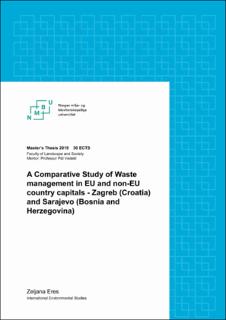| dc.description.abstract | This study is an analysis of current household waste management in the capital of Croatia – Zagreb, and the capital of Bosnia and Herzegovina – Sarajevo. It is a comparative study which examines the differences between the waste management policies and implementation in an European Union country (Croatia) and a non-European Union country (Bosnia and Herzegovina). The analysis is done by using the framework for analysing resource-use problems, by Vatn (2005). By analysing waste-use problems in these capitals we can better understand the reasons behind the efficiency of the current waste management. The data is obtained from various policy documents, statistics and reports, but also from interviews with relevant respondents from Croatia and Bosnia and Herzegovina. The findings on the current institutions/regimes affecting the waste, main agents and their choices, technologies available for the utilizaton of waste, attributes of waste and the outcomes of their interactions are presented in the framework for both Zagreb and Sarajevo. The findings suggest that both cities are in need of a more efficient waste management. Both Zagreb and Sarajevo are facing a number of problems when it comes to waste mismanagement: a degraded environment, inappropriate waste disposal as an endangerment to human health, loss of the potential financial gains, negative public’s perception on waste, desperate need for establishing selective disposal and collection, as well as the fully operational waste management facilities, insufficient funding and all waste is treated as garbage. The results also suggest that Zagreb, although it has better conditions than Sarajevo, and it has been a member of the European Union since 2013, does not have a more efficient waste management than Sarajevo. The findings also indicate that various changes need to happen in order to achieve adequate waste management in both cities, like changing the negative public's perception on waste and establishing a functional waste management center. | en_US |

